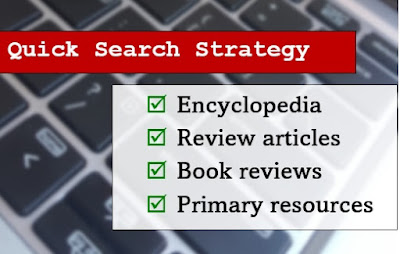Quick search strategy
How can you quickly locate relevant information and publications on a topic? This is a question I asked myself a few weeks ago when I was preparing a short library tour on our UvA Library Film club night. The featured movie was going to be: All the president's men on the watergate scandal which led to President Nixon's downfall. Apart from discussing the system of democracy and the importance of its controlling institutions (like archives), I wanted to highlight where relevant literature and resources on watergate could be found at the UvA Library. To find the answers, I used my Quick Search Strategy. The steps in this approach can be applied to every (broad) topic and will provide a general idea of its academic discussions and resources. It is essential in this process to keep your search term(s) simple and broad. In this case, I used: watergate.
1. Check an encyclopedia
A lemma in an encyclopedia will provide a quick overview of historical events. Of course, you can check a general encyclopedia like Encyclopaedia Britannica, but there are also specific encyclopedias for subject areas. In this case, I looked at the Encyclopedia of American Studies. Except for the content, the references to resources in the notes are often very useful.
 |
3. Check book reviews to find recent publications
Search for book reviews, published within the last 5 years, to find out what the latest books are on the topic and how those new books are related to the historiography. You can use a filter on (book) reviews in CataloguePlus and in some bibliographical databases, like Web of Science and Academic Search Premier.
 |
Except for Web of Science core collection, book reviews and review articles are usually merged in one filter, often called reviews. This is for instance the case in CataloguePlus and Academic Search Premier.
We have two large collections with primary resources: AM Explorer and Archives Unbound. You can search on a keyword to find out what databases within the collections are relevant to your topic. In this way, you will discover that both resources have specific databases with scanned archive materials on Nixon. AM Explorer also provides an interesting timeline as well.
Other topics?
What if your topic is not about American history, but about the Netherlands? Although the strategy will be the same. (encyclopedia, review articles, book reviews, primary sources), you will probably use CataloguePlus more for book reviews and look for other primary sources, depending on your topic (archieven.nl, delpher.nl, pamphlets, etc). It is important to use English keywords. Both CataloguePlus and the databases use English subject terms even for articles in other languages.
From broad to narrow scope
My quick search strategy provides an introduction to a broad topic. It can give you a general insight after which you can narrow it down with a specific research question and start in-depth research that could result in a monograph or academic article.
Related links
- Databases overview UvA
- Blog post on encyclopedias
- 3 Thesis tips
- What are the right keywords?
- Finding literature with Google Scholar
- American Studies resources





Comments
Post a Comment